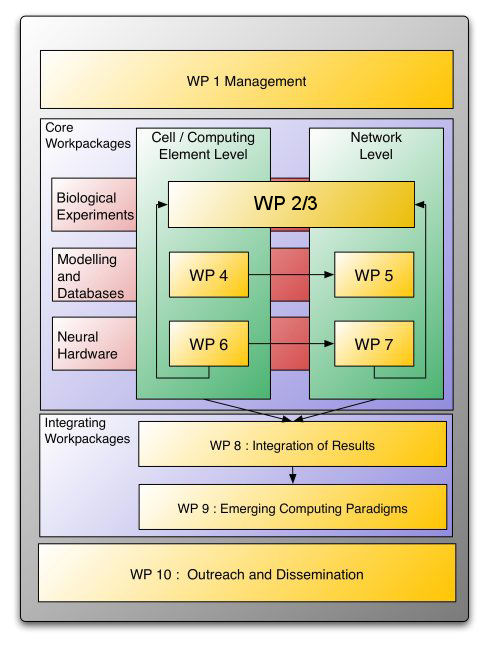 Structure of the FACETS Project[]
Structure of the FACETS Project[]
The implementation of the FACETS scientific, training, demonstration and management goals is organised into 10 workpackages (WP). Here, 8 scientific workpackages are complemented by 2 workpackages handling the aspects of management (WP 1) and outreach and dissemination (WP 10), respectively. An organisational chart of the FACETS workpackage structure and their interdependencies is given in the figure below.

The basic concept of the implementation plan is to create 6 small size, scientifically focused, and rather autonomous subgroups which work on well defined fields providing the specific knowledge required to reach the overall project goal.
These 6 subgroups work on the 6 "Core Workpackages" (CWs) WP 2 - WP 7. In the spirit of autonomous operation, the day-to-day collaboration within the CWs will be very intense and they organise scientific exchange, ad-hoc meetings, workshops, and training activities according to their own specific needs.
The 6 Core Workpackages address the following topics:
- WP 2/3[1]:
- WP 2: Biological Experiments at the Cell Level
- WP 3: Biological Experiments at the Network Level
- WP 4: Modelling and Database at the Cell Level
- WP 5: Modelling at the Network Level
- WP 6: Neural Hardware at the Cell Level
- WP 7: Neural Hardware at the Network Level
Beyond those CWs, a dedicated WP 8 takes care of integrating the individual results. This WP is of particular importance to make best use of the unique interdisciplinary power assembled in the FACETS project. Furthermore, a major scientific goal of the FACETS projects is to apply the accumulated knowledge in biology, modelling, and hardware design to explore and exploit emerging new computing paradigms. WP 9 is dedicated to this challenge. WP 8 and WP 9 are called "Integrating Workpackages" (IW).
Finally, WP 10 is organised to spread the knowledge available and acquired within the consortium internally, in the scientific community, and to the public. Among other activities, it is planned to organise within the FACETS community several workshops to ensure that scientists (especially young scientists) have access to cross-disciplinary training. This is necessary to promote communication within the consortium and to improve in-depth understanding of partners' approaches. Furthermore, the FACETS partners will organise annual meetings which are open to the scientific community.
While every single workpackage integrates the concerted effort of multiple participants, each is coordinated by a dedicated workpackage leader from one of the participating institutions. The workpackage leaders are:
- WP 1: Karlheinz Meier, Ruprecht-Karls-Universität Heidelberg, Germany
- WP 2/3[1]: Yves Fregnac, CNRS-UNIC, Gif-sur-Yvette, France
- WP 4: Wulfram Gerstner, Brain-Mind Institute, EPFL Lausanne, Switzerland
- WP 5: Alain Destexhe, CNRS-UNIC, Gif-sur-Yvette, France
- WP 6: Sylvie Renaud, Ecole Nationale Supérieure de Bordeaux, France
- WP 7: Johannes Schemmel, Ruprecht-Karls-Universität Heidelberg, Germany
- WP 8: Theodore Papadopoulo, INRIA, Sophia-Antipolis, France
- WP 9: Wolfgang Maass, TU Graz, Austria
- WP 10: Kirsty Grant, CNRS-UNIC, Gif-sur-Yvette, France



